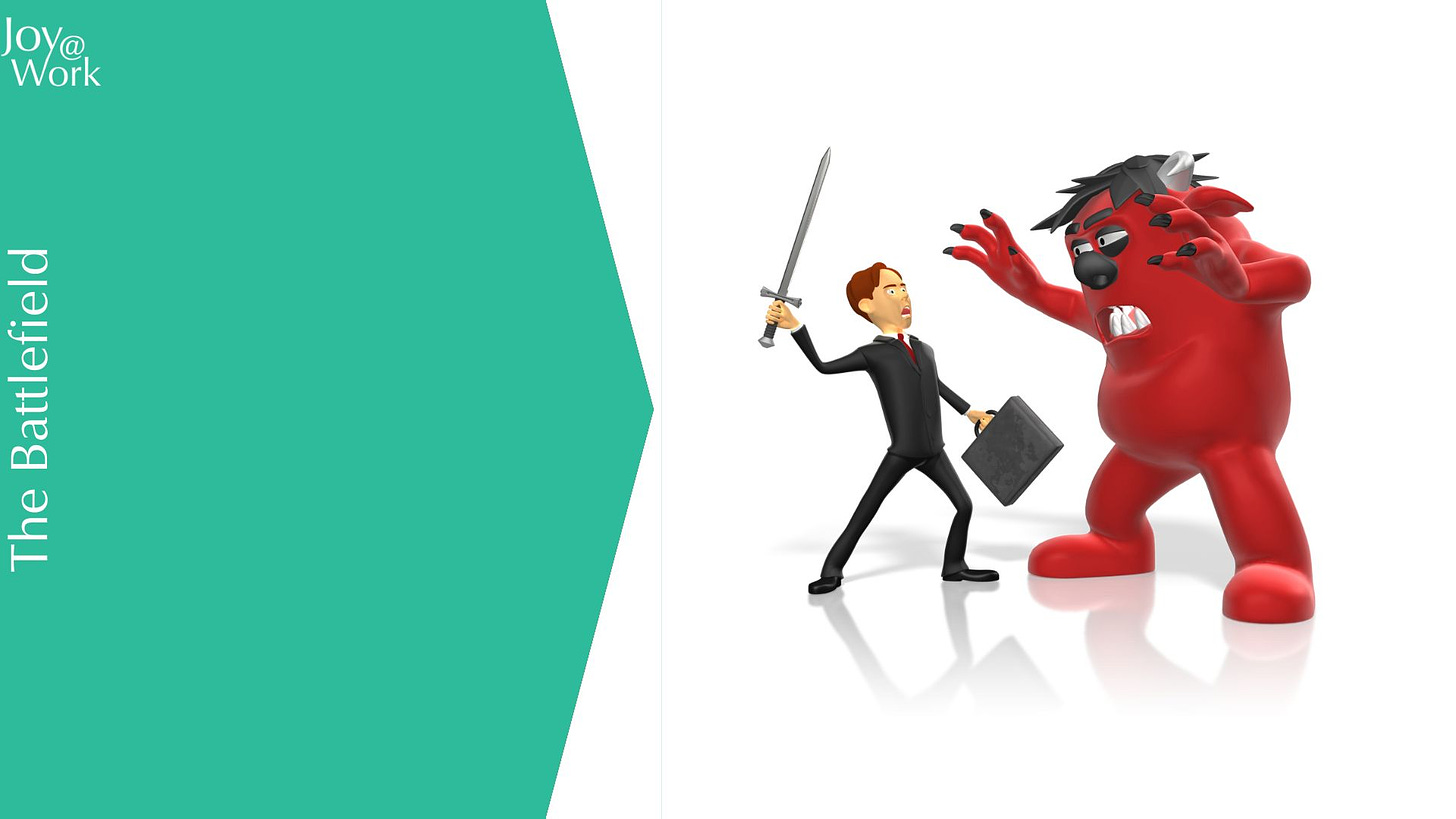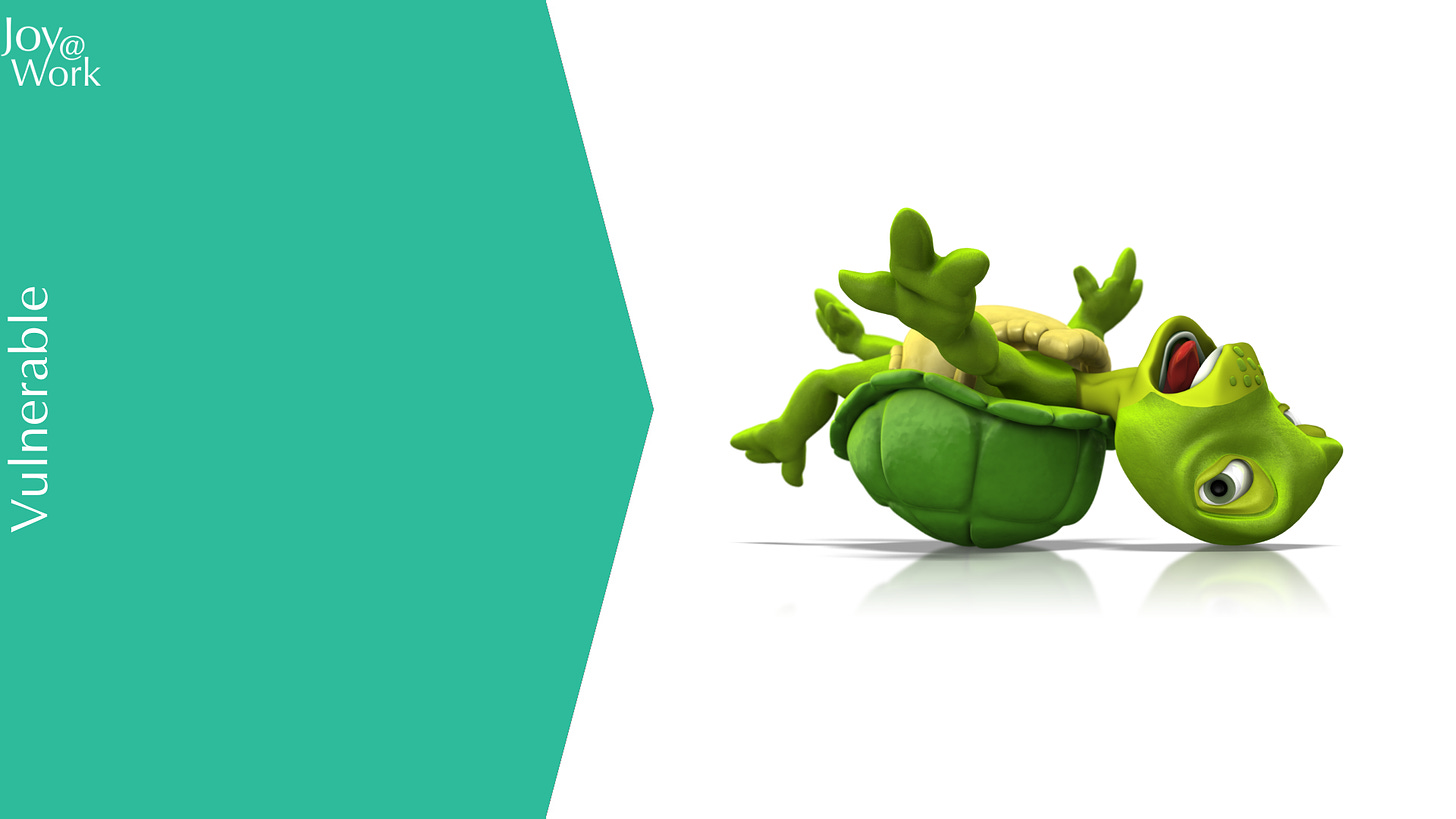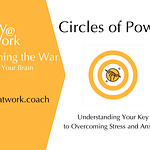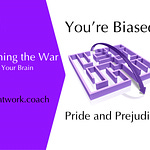Now that we know Why Joy@Work Matters, it’s time to let you know about a battle going on in your brain.
Imagine a battlefield with two opposing sides. Only one side doesn’t realise that it’s in a battle!
The enemy is steadily picking them off one by one and there’s no retaliation. Just acceptance. 🎶 Que sera sera 🎶. “Life is difficult!” “What do you expect me to do?” “They’re bigger, more important, smarter, slimmer, richer, stronger, prettier, older, younger, senior, more talented, more experienced, better connected, luckier…” Did I miss yours? Add it to the list.
In my experience, there are two types of leader who struggle the most in this battle:
1. Those who (secretly) believe they are not good enough - the Imposters
2. Those who need to be recognised as significant and important - the Egomaniacs
The Imposters
These are people who, often secretly, think they are somehow lacking but don’t want anyone else to know it. Instead they have to be seen as invulnerable. Stoic, “stiff upper lip and all that chaps”. Whatever you do, don’t let your emotions show. In that lies weakness and when people see that I’m weak, they’ll attack and destroy me.
Inside they’re ashamed to be living a lie and, afraid to empathise, don’t open up to deep relationships or dare to ask for what they truly desire and struggle for worthiness. They desperately want to be liked by others for who they are, but dare not show who they are because they don’t like themselves very much.
Instead they allow the enemy to chip away and wear them down thinking that they “deserve it for not being good enough”.
The Egomaniacs
These are people whose ego makes them over-estimate their own abilities and worth, and under-estimate the effort and skill required to achieve their goals. They feel superior to and better than others. And they need to be recognised for their significant greatness.
Ego is the outsized sense of self-importance. It is the toxic force that makes real teamwork, empathy, vulnerability and artistry impossible. Ego Is The Enemy - Ryan Holiday.
The enemy simply has to “poke the bear” and the egomaniac inflicts damage to themselves and bullies and blames everyone else and their own team.
Some Imposters protect themselves by becoming Egomaniacs:
And its easy to flip from one to the other in six steps as Brene Brown shares in Dare to Lead about the armour we use to protect our vulnerability. Here’s six pieces of armour from Imposter (“I’m not good enough”) to Egomaniac (“I’m better than them”):
1. I’m really not good enough. [Imposter Syndrome]
2. But if I’m open and honest about this, people will think less of me or even use it against me. [Shame]
3. No way am I going to be honest about this. No-one else does… why should I? They’re not honest about anything and they’ve plenty of issues. [Accusation]
4. It’s their issues and shortcomings that make me act this way. [Blame]
5. It’s their fault. And they’re blaming me! [Anger]
6. In fact, now that I think about it, I’m actually better than them. [Superiority]
- My Ego is stroked [Egomaniac]
You cannot change what you do not confront!
You cannot control what happens outside. You only control your own thoughts and your own actions. Sorry, you CAN only control your thoughts and your actions. It’s your choice.
You can influence others and some things outside but you do not control them.
It’s time for you to become a thought warrior. It’s time for you to dare to have Joy@Work.
When you dare to have Joy@Work you’ll feel vulnerable and focus your attention on helping and recognising others.
When you have Joy@Work you will feel vulnerable
Many leaders ask me to help their teams trust each other and improve collaboration. They know it’s hugely beneficial and profitable for that to be the case. But they fear being vulnerable to their team because the team isn’t trusted by the leader - so why would they trust each other? Let alone collaborate?
Once you accept that you cannot control what will happen but you still speak or act in an authentic way - that’s being vulnerable. And only when you are being vulnerable are you able to build authentic, supportive and trusting relationships.
When you have Joy is when you feel most vulnerable. But because it is rare (or we only allow ourselves to feel it rarely) it is most often a “foreboding joy”. We insist on rehearsing tragedy (when will the shit hit the fan?)
It is beauty and fragility and deep gratitude and impermanence wrapped up in one emotion.
Why? Because joy is rare and we’re not used to it. And we don’t trust it… yet.
When we practice Joy@Work we focus on others
Those who practice sustaining joy have one thing in common, they practice gratitude. Not an attitude. It’s a practice!
At dinner everyday you say or sing grace; thanks to God for your food, share one thing you’re grateful for today.
And recognise other’s achievements at work! Every day and eventually, every one. Rinse. Repeat. Celebrate the small wins. It could all go sideways in five minutes. Celebrate now and recognise good work. Engagement increases, retention improves, performance goes up.
And for those with Imposter Syndrome (“I’m not good enough”)
You are not how other’s say (or have said) you are. God says “I say how you are. You are qualified to achieve my purpose for you.”
It’s time to have the courage to be vulnerable, to practice gratitude and recognising others, it’s time to dare to have Joy@Work!
The Biblical way to win the battle in our brain.
The apostle Paul in Phi 4:12 and 2 Cor 10:5 shares:
1. The battle for your life is won or lost in your mind
2. Your thoughts will control you. So you have to control your thoughts.
OK. Are you ready to Dare to have Joy@Work? Excellent.
Now, we need to spend a little time understanding and recognising that each of us are biased! And knowing your own biases is incredibly important. Next Pride and Prejudice.




















Share this post